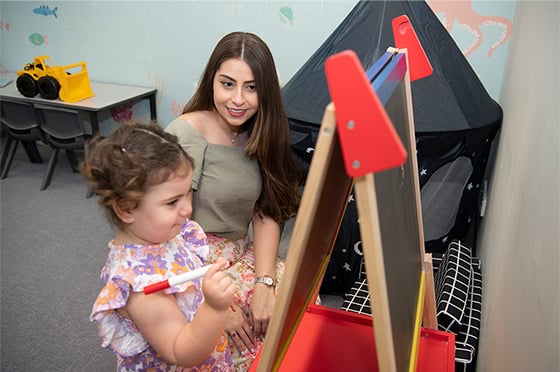 Senior Speech Pathologist Marisa Di Lorenzo looks at social communication and language outcomes for bilingual autistic children.
Senior Speech Pathologist Marisa Di Lorenzo looks at social communication and language outcomes for bilingual autistic children.
I sometimes get asked by bilingual parents of autistic children whether it’s OK to use more than one language with their child, or whether this will impact their language development.
Even though there are more bilingual speakers than monolingual speakers globally, there is still little research evidence around social communication and language outcomes for bilingual autistic children.
Most existing research for autistic children has focused on communication development and outcomes in a single language, usually English. So, what do we know about supporting language development for autistic children raised in bilingual or multilingual environments?
One recent study (Siyambalapitiya, 2021) compared 60 monolingual with 60 bilingual autistic children over a 12-month period. Both received community-based early intervention and at the end of the 12-month period, there were no significant differences between the two groups of children in terms of their communication outcomes. The findings support the idea that exposure to a second language does not negatively impact communication and language development.
There is also a growing body of evidence indicating that as well as there being no negative effects on communication development, in some cases, there are positive effects on social communication, cognitive development and pragmatic development (e.g. Gonzalez-Barrero & Nadig, 2019; Hambly & Fombonne 2012; Petersen et al. 2012; Reetzke et al. 2015; Uljarevic et al. 2016)
Another study (Digard B., 2020) compared self-ratings in social life quality within mono, bi and multilingual autistic adults to better understand the language learning and social experiences of autistic people who speak one, two or more languages. One interesting learning from this research was that those with many languages reported being more satisfied with their social life than those with fewer languages.
While these finding are encouraging and provide some short and long-term benefits for using more than one language with your child, there is still a need for further research in this area.
So what do I tell parents who ask me whether it’s OK to speak more than one language to their child?
I tell them….
- The current research shows no negative impact of using more than one language on a child’s communication development. In fact, research has found some short and long-term positive outcomes.
- Do what feels comfortable for you and your family – language is often a big part of a family’s cultural identity and important for that child’s sense of belonging to the smaller and broader family unit.
- Don’t worry if your child mixes the languages they are exposed to as this is a normal part of acquiring more than one language.
- If you think your child has a language delay speak to your speech and language therapist about ways to support language development.
